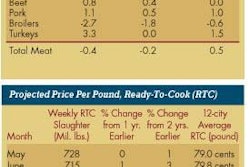Labor's biggest problem is declining membership. Only 12.5% of workers in the U.S. belong to unions, and that includes public-sector employees such as teachers and police officers. In the private sector, unions represent only 7.5% of employees, according to the Bureau of Labor Statistics.
The unions are desperate to increase their numbers, especially in the private sector. They see their chance with the Democrats in control of the White House and Congress.
End of secret ballot?
Their weapon is 'card check.' This would get rid of the requirement that a union seeking to represent a work unit has to win a majority of the votes in a secret ballot (also called private-ballot) election monitored by the National Labor Relations Board. Instead, the union would win the right to represent the workers merely by collecting authorization cards signed by a majority of the workers.
The possibilities of abuse here are obvious. Confronted by intimidation from union organizers, many employees are going to sign the cards whether they want to or not.
Ironically, one of the strongest statements in favor of the secret ballot comes from the AFL-CIO itself, which once said that it "provides the surest means for avoiding decisions which are the result of group pressures and not individual decisions." Amen, brother. However, the AFL-CIO was referring to decertification elections, in which workers can get rid of a union. In that case, it seems the shoe is on the other foot.
Apparently, the secret ballot is good for Mexican workers, not American ones. In 2001, more than a dozen Democratic members of Congress wrote to the government of Mexico. "We feel the private ballot is absolutely necessary in order to ensure workers are not intimidated into voting for a union they may otherwise not choose." Yes! That's it exactly! Unfortunately, most of those Democratic congressmen who are still in office are now in favor of getting rid of the private ballot in U.S. labor elections.
Members of Congress also believe in the secret ballot when they hold internal elections to select their leaders and committee chairmen. Indeed, the secret ballot has long been a cornerstone of democracy, but it no longer serves the purposes of organized labor.
Grabbing even more
Labor's power-grab does not end with card check. The same bill would enable a union to get its way in contract negotiations simply by out-waiting the employer. It provides that if a newly recognized union and an employer fail to agree on a contract within 120 days, the Federal Mediation and Conciliation Service will appoint an arbitration board to "render a decision settling the dispute." The arbitrators' decision will be good for at least two years. The head of the FMCS is appointed by the President, and labor seems willing to bet that the arbitrators' decision would go in the union's favor.
The AFL-CIO president, John Sweeney, claims that 150,000 labor volunteers made 5.5 million phone calls and visited 4 million union households in the last four days of last year's campaign. Labor takes credit for putting the Obama-Biden ticket over the top in Florida, Indiana, Nevada, Ohio, Pennsylvania and Wisconsin. Two-thirds of the members of AFL-CIO unions voted for the Democratic ticket, according to a Hart Research survey. In political terms, that kind of support spells C-L-O-U-T.
Call your senator
Ramming card check through Congress is the "Number One priority" for organized labor, according to Sweeney. The unions have the gall to call their bill the "Employee Free Choice Act." President Obama and Vice President Biden both voted for the bill when they were Senators, and it easily passed the House of Representatives even before the Democrats padded their margin in last year's elections. So the only bulwark against this travesty is the Senate, where 41 votes can stop any bill in its tracks. Let's hope 41 votes can be found.
Business and industry are fighting the labor power grab through the Coalition for a Democratic Workplace, www.MyPrivateBallot.com, and other efforts. I hope that all members of industry will let their elected officials know that labor is going too far, and that the private ballot should be respected in union elections as well as public ones. The U.S. Senate will be the real battleground when this issue is decided.






.jpg?auto=format%2Ccompress&fit=crop&h=167&q=70&w=250)











